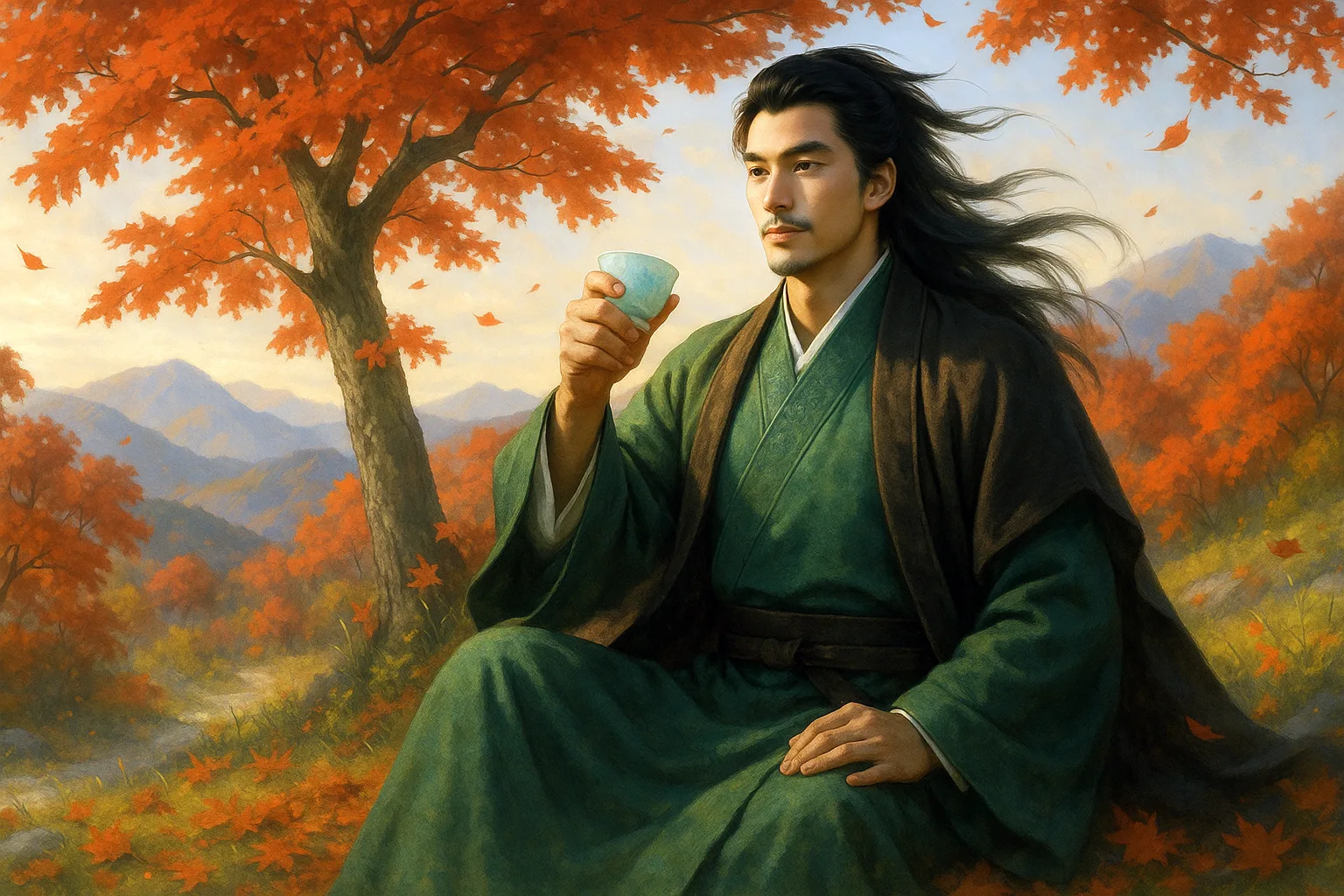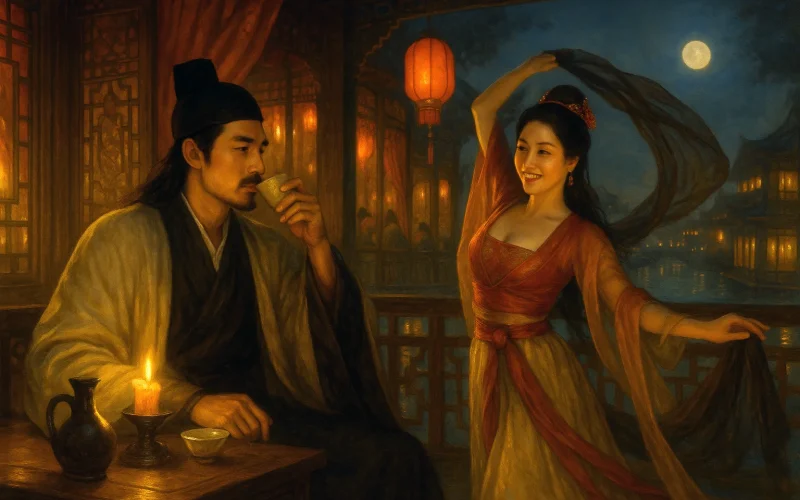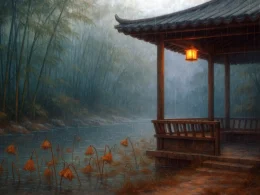With my wine-bottle, watching by river and lake
For a lady so tiny as to dance on my palm,
I awake, after dreaming ten years in Yangzhou,
Known as fickle, even in the Street of Blue Houses.
Original Poem:
「遣怀」
杜牧
落魄江湖载酒行,楚腰纤细掌中轻。
十年一觉扬州梦,赢得青楼薄幸名。
Interpretation:
"A Confession" was written around 850 AD during the reign of Emperor Xuanzong of the Tang Dynasty. In his youth, Du Mu served as an aide in Yangzhou, where he indulged in a life of pleasure and excess. A decade later, looking back on those years, he deeply regretted his frivolous and indulgent lifestyle. This poem is a reflection on his past and a self-mocking critique, expressing both regret for wasted years and a lament for the fleeting nature of time and life.
First Couplet: "落魄江湖载酒行,楚腰纤细掌中轻。"
Luòpò jiānghú zài jiǔ xíng, Chǔ yāo xiānxì zhǎng zhōng qīng.
Adrift in the world, I wandered with wine in hand, captivated by the slender waists and graceful dances of the singing girls.
Du Mu begins by describing his former life of indulgence. The phrase "adrift in the world" (落魄江湖) conveys a sense of aimlessness and disillusionment, while "wine in hand" (载酒行) symbolizes his escapism and hedonism. The reference to "slender waists" (楚腰纤细) alludes to the beauty of the singing girls, highlighting the allure of his past lifestyle. However, beneath the surface of this seemingly carefree existence lies a deeper sense of emptiness and unfulfilled ambition.
Second Couplet: "十年一觉扬州梦,赢得青楼薄幸名。"
Shí nián yī jiào Yángzhōu mèng, yíngdé qīnglóu bó xìng míng.
Ten years in Yangzhou feel like a dream; all I gained was a reputation for heartlessness in the pleasure quarters.
This couplet captures the essence of Du Mu's regret. The phrase "ten years feel like a dream" (十年一觉扬州梦) contrasts the long passage of time with the fleeting nature of his experiences, emphasizing the emptiness of his past. The final line, "a reputation for heartlessness in the pleasure quarters" (赢得青楼薄幸名), is a self-deprecating remark that underscores the futility of his youthful indulgence. What once seemed like pleasure and fame now feels hollow and meaningless.
Overall Appreciation
This poem is a poignant reflection on the passage of time and the consequences of a life lived in pursuit of fleeting pleasures.
The first couplet vividly depicts Du Mu's former lifestyle, filled with wine, music, and the company of singing girls. However, the underlying tone of aimlessness and disillusionment suggests that this lifestyle was ultimately unfulfilling.
The second couplet shifts to a more introspective tone, as Du Mu reflects on the past decade. The metaphor of Yangzhou as a dream highlights the ephemeral nature of his experiences, while the self-mocking remark about his reputation underscores the emptiness of his former pursuits.
The poem's strength lies in its ability to blend vivid imagery with deep emotional resonance. Du Mu's regret and self-awareness are palpable, making the poem a powerful meditation on the importance of living a meaningful life.
Writing Characteristics
- Vivid Imagery and Symbolism
Du Mu uses vivid imagery, such as "wine in hand" and "slender waists," to depict his former lifestyle, while the metaphor of Yangzhou as a dream symbolizes the fleeting nature of his experiences. - Self-Deprecating Tone
The poem's self-mocking tone, particularly in the final line, adds depth to Du Mu's reflections, highlighting his regret and self-awareness. - Contrast Between Past and Present
The contrast between the long passage of time and the fleeting nature of his experiences emphasizes the emptiness of his past and the importance of living a meaningful life.
Insights
This poem serves as a powerful reminder of the importance of living a purposeful life. Du Mu's reflections on his wasted years and the emptiness of his former pursuits resonate deeply, encouraging us to consider the consequences of our own choices.
The poem also highlights the fleeting nature of time and the importance of self-awareness. Du Mu's ability to reflect on his past and acknowledge his mistakes is a testament to the value of introspection and growth.
Ultimately, "A Confession" is a meditation on the passage of time, the consequences of indulgence, and the importance of living a life of meaning and purpose. It challenges us to reflect on our own lives and to strive for a balance between enjoyment and fulfillment.
Poem translator:
Kiang Kanghu
About the poet:

Du Mu (杜牧), 803-853 AD, was a native of Xi'an, Shaanxi Province. Among the poets of the Late Tang Dynasty, he was one of those who had his own characteristics, and later people called Li Shangyin and Du Mu as "Little Li and Du". His poems are bright and colorful.












